(Colossians 2:13-17) Did God’s Festivals and Sabbaths Come to an End at Christ’s Death?
Posted Jan 10, 2025 by Kevin J. Mullins in Questions Concerning Feast Days and Sabbaths
“And you, being dead in your sins and the uncircumcision of your flesh, hath he quickened together with him, having forgiven you all trespasses; Blotting out the handwriting of ordinances that was against us, which was contrary to us, and took it out of the way, nailing it to his cross; And having spoiled principalities and powers, he made a shew of them openly, triumphing over them in it. Let no man therefore judge you in meat, or in drink, or in respect of an Holyday, or of the New Moon, or of the Sabbath days: Which are a shadow of things to come; but the body is of Christ.” (Colossians 2:13-17, King James Version)
Most teachers in mainstream Christianity use these verses as “proof” that God’s yearly Festivals (holydays), monthly New Moons, and weekly Sabbaths outlined in Leviticus 23 have been done away with (nailed to His cross). Their angle is Paul is writing to Christians who do NOT keep these Festivals and Sabbaths encouraging them to not let anyone else judge them for their refusal to do so. For example, the Contemporary English Version translates Colossians 2:16 like this:
"Don't let anyone tell you what you must eat or drink. Don't let them say you must celebrate the New Moon festival, the Sabbath, or any other festival." (Colossians 2:16)
In this article we will discuss whether or not this claim is true.
"These are My Feasts"
Before we get into it, let’s first determine that all of God’s Festivals, including weekly the seventh-day Sabbath, are GOD’S Feast days:
“And the Lord spoke to Moses, saying, 'Speak to the children of Israel, and say to them: ‘The feasts of the Lord, which you shall proclaim to be holy convocations, these are My feasts.” (Leviticus 23:1-2)
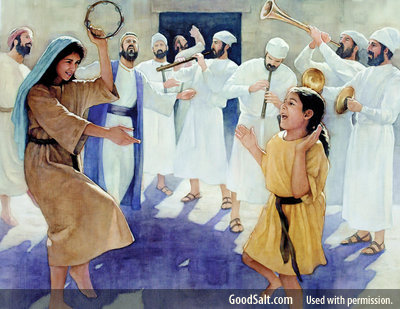 God then outlines all of His Feasts:
God then outlines all of His Feasts:
- The Seventh-day Sabbath (Verse 3)
- The Passover (Verses 4, 5)
- The Days of Unleavened Bread (Verses 6-8)
- Firstfruits (Verses 9-14)
- Pentecost (Verses 15-22)
- Trumpets (Verses 23-25)
- Day of Atonement (Verses 26-32)
- Tabernacles (Verses 33-44)
As you can see, all of these are considered as being Feast Days. This is important because one group of Sabbatarians (Sabbath keepers) claim that the weekly Seventh-day Sabbath should not be grouped in among the official Feast Days. But this does injustice to God’s clear word as seen above. Interestingly, they try to use Leviticus 23:37-38 as their proof-text:
“These are the feasts of the Lord which you shall proclaim to be holy convocations, to offer an offering made by fire to the Lord, a burnt offering and a grain offering, a sacrifice and drink offerings, everything on its day— besides the Sabbaths of the Lord, besides your gifts, besides all your vows, and besides all your freewill offerings which you give to the Lord.”
They say that the phrase, “besides the Sabbaths of Lord” separates the weekly Sabbath from "the feasts of the Lord." The claim is, since it was engraved upon one of the stone tablets, the weekly Sabbath is moral and thus eternal, but since the Feast Days were only written in a book (the Book of Moses) they were only ceremonial and thus temporary and were done away with at the cross. To get around the fact that Colossians 2:16 mentions "Sabbath days" along with "Holy Days" and the "New Moon", they say these "Sabbath days" refer to the annual Sabbaths that fall on Festivals such as The Day of Trumpets and The Day of Atonement:
- Day of Trumpets: “Speak to the children of Israel, saying: ‘In the seventh month, on the first day of the month, you shall have a sabbath-rest, a memorial of blowing of trumpets, a holy convocation." (Leviticus 23:24)
- Day of Atonement: “Also the tenth day of this seventh month shall be the Day of Atonement ... It shall be to you a sabbath of solemn rest, and you shall afflict your souls; on the ninth day of the month at evening, from evening to evening, you shall celebrate your sabbath.” (Leviticus 23:27,32)
Thus their answer to mainstream Christianity is "Yes, all the festivals are done away with, but when Paul says 'sabbath days' in Colossians 2:16, he is only speaking of the annual 'ceremonial Sabbaths' that were 'nailed to the cross' but the weekly Sabbath remains."
However, that’s not what the phrase, "besides the Sabbaths of the Lord", is saying at all. It is referring to the offerings and sacrifices made upon the Festivals and Sabbaths. If an annual Festival fell upon the weekly Sabbath, then the sacrifices that were offered upon the annual day will be offered “besides” or “in addition to” the weekly Sabbath offering. There were also two main sacrifices offered daily— morning and evening. Numbers 28:9-10 uses the same wording found in the above text in Leviticus when God instructs His people that the offerings presented upon the weekly Sabbath will be “besides” (in addition to) the offerings presented daily:
"And on the Sabbath day two lambs in their first year, without blemish, and two-tenths of an ephah of fine flour as a grain offering, mixed with oil, with its drink offering— this is the burnt offering for every Sabbath, besides [in addition to] the regular [the daily] burnt offering with its drink offering."
Here are some alternate translations of Leviticus 23:38:
- Berean Study Bible: “These offerings are in addition to the offerings for the LORD’s Sabbaths, and in addition to your gifts, to all your vow offerings, and to all the freewill offerings you give to the LORD.”
- New Living Translation: “These festivals must be observed in addition to the LORD’s regular Sabbath days, and the offerings are in addition to your personal gifts, the offerings you give to fulfill your vows, and the voluntary offerings you present to the LORD.”
- Holman Christian Standard Bible: “These are in addition to the offerings for the LORD's Sabbaths, your gifts, all your vow offerings, and all your freewill offerings that you give to the LORD."
- Contemporary English Version: “These festivals must be celebrated in addition to the Sabbaths and the times when you offer special gifts or sacrifices to keep a promise or as a voluntary offering.”
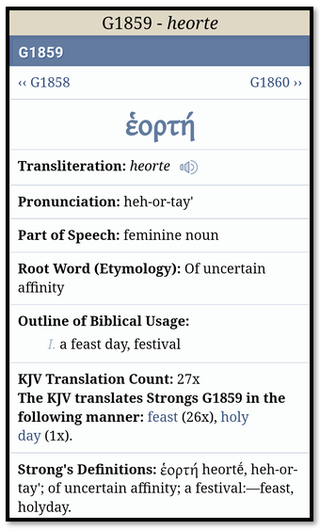 The Greek word Paul uses for Holy Day in Colossians 2:16 is ἑορτή (heorté) which means "a feast day, a festival." This would include the annual Festivals that God calls "Sabbaths." Although the King James Version translates it as "holyday" in Colossians 2, it is translated as "feast" elsewhere (see, Luke 2:42; John 2:23; 7:2, 8, 10, 11, 14, 37 for a few examples).
The Greek word Paul uses for Holy Day in Colossians 2:16 is ἑορτή (heorté) which means "a feast day, a festival." This would include the annual Festivals that God calls "Sabbaths." Although the King James Version translates it as "holyday" in Colossians 2, it is translated as "feast" elsewhere (see, Luke 2:42; John 2:23; 7:2, 8, 10, 11, 14, 37 for a few examples).
Furthermore, the Greek word for "Sabbath" Paul uses is σάββατον (Sabbaton) which always refers to the weekly seventh-day Sabbath throughout the New Testament Scriptures. Some argue that since sabbaton is a plural word, this indicates something other than the weekly Sabbath. But the plural form is used many times for the weekly Sabbath, and only in a secondary sense meaning seven days (a week). For example, the plural nature of sabbaton can be seen in Mark 15:42:
“Now when evening had come, because it was the Preparation Day, that is, the day before the Sabbath [sabbaton].”
The meaning here is "the day before every Sabbath."
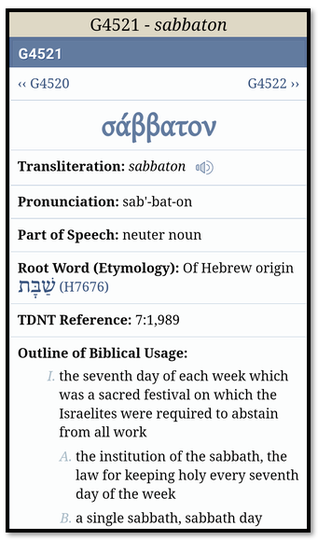 In Luke 4:16 we read:
In Luke 4:16 we read:
"So He [Jesus] came to Nazareth, where He had been brought up. And as His custom was, He went into the synagogue on the Sabbath day [sabbaton], and stood up to read."
Again, the meaning is Jesus went into the synagogue "on every Sabbath." These plurals indicate the recurring nature of the weekly Sabbath.
The phrase “Festivals, New Moons, or Sabbaths” (heortes, noumenias, sabbaton) in Colossians 2:16 is found nowhere else in the New Testament, but occurs five times in the Greek translation of the Old Testament called The Septuagint (2 Chronicles 2:4; 31:3; Nehemiah 10:33; Ezekiel 45:17; Hosea 2:11). Each time the reference is to the appointed Feasts (yearly), New Moons (monthly), and the Sabbaths (weekly). Sometimes the order is reversed, but in each case, “new moon” is in the middle, thus making a logical sequence from weekly to yearly or yearly to weekly. The implication is that Colossians 2:16 absolutely includes the weekly Sabbath.
Did Paul Act Contrary to His Own Writings?
So, is mainstream Christianity correct in claiming Paul is saying these were all "nailed to the cross" and believers in Christ should have nothing to do with these Festivals and Sabbaths? Well, in Acts chapter 18 we read that Paul himself was determined to keep the Feast of Pentecost, using the word, heorté:
"When they [the Jewish company] asked him [Paul] to stay a longer time with them, he did not consent, but took leave of them, saying, 'I must by all means keep this coming feast [heorté] in Jerusalem; but I will return again to you, God willing.' And he sailed from Ephesus." (Acts 18:20-21)
It would make no sense for Paul to be determined to celebrate a feast day (heorté) that had been "nailed to the cross." Another Greek word which comes from heorté is the word ἑορτάζω (heortazo) which means "to take part in a Feast" or "to keep a Feast." Paul uses this word in his letter to the Corinthian believers teaching them how to celebrate the Feast of Passover/Unleavened Bread properly:
"Your boasting is not good. You know that a little yeast leavens the whole batch of dough, don’t you? Get rid of the old yeast so that you may be a new batch of dough, since you are to be free from yeast. For the Messiah, our Passover, has been sacrificed. So let’s keep celebrating the festival [heortazo], neither with old yeast nor with yeast that is evil and wicked, but with yeast-free [unleavened] bread that is both sincere and true." (1 Corinthians 5:6-8, International Standard Version)
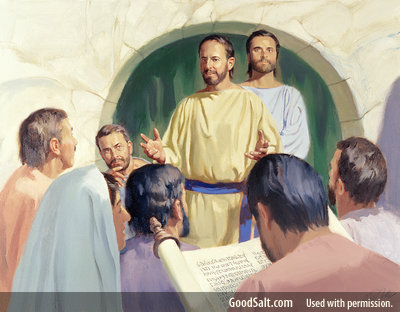 Again, this letter to the Corinthian believers makes no sense if Paul believed the Festivals and Sabbaths were "nailed to the cross." By reading verses 1-4 in Acts chapter 18 it is clear that the Corinthian believers were indeed weekly Sabbath keepers as well:
Again, this letter to the Corinthian believers makes no sense if Paul believed the Festivals and Sabbaths were "nailed to the cross." By reading verses 1-4 in Acts chapter 18 it is clear that the Corinthian believers were indeed weekly Sabbath keepers as well:
“After these things Paul departed from Athens, and came to Corinth ... And he reasoned in the synagogue every Sabbath, and persuaded the Jews and the Greeks [Gentiles].” (Acts 18:1-4)
Yes, the church at Corinth included some Jews (1 Corinthians 7:18-19), but it was largely composed of Sabbath-keeping Gentile converts (1 Corinthians 6:9-11; 8:7; 12:2).
“The Corinthian church was plagued with factional and moral problems. To bring its members back to proper Christian behavior, Paul appeals to the feasts of Passover and Unleavened Bread as a model for what Christians should be … Passover serves as a model for the Christian life-style because Jesus is the Passover Lamb who is constantly present as Victim and Savior. Christians who participate in Passover celebrate not merely past deliverance from Egyptian slavery but, primarily, present redemption from all evil and sins. This allusion is also found in 1 Peter, where the Apostle urges believers to live holy lives because ‘You know that you were ransomed from the futile ways inherited from your fathers, not with perishable things, such as silver or gold, but with the precious blood of Christ, like that of a lamb without blemish or spot’ (1 Peter 1:18-19).” (Samuele Bacchiacchi, God’s Festivals in Scripture and History, Part 1, The Spring Festivals, pp. 76,77)
The book of Acts tells us it was Paul's "custom" to observe and teach upon the weekly Sabbath (Acts 17:1-2). He celebrated Passover/Unleavened bread in Philippi (Acts 20:6), as well as Pentecost in Jerusalem (Vs. 16).
Since Paul himself continued to keep the Festivals and Sabbaths along with Jewish and Gentile believers in Christ, what is he trying to teach the Colossian believers? Let’s begin to briefly dissect what Paul is really talking about in Colossians chapter 2.
The Commandments and Traditions of Men
Back in verse 8, Paul warns the Colossians to “Beware lest anyone cheat you through philosophy and empty deceit, according to the tradition of men, according to the basic principles of the world, and not according to Christ.” The key phrase here is “after the traditions of men.” Are the Festivals and Sabbaths “after the traditions of men” or are they according to the divine statutes from God? In verse 20-22 Paul continues this thought by saying:
“Therefore, if you died with Christ from the basic principles of the world, why, as though living in the world, do you subject yourselves to regulations— 'Do not touch, do not taste, do not handle,' which all concern things which perish with the using—according to the commandments and doctrines of men?”
Again, are the God-given Festivals and Sabbaths “according to the commands and teachings of men”? No. The context of Colossians 2 is in regards to the imposing of man-made rules and regulations. Six times the words man or men appear in this chapter.
2:4 “And this I say, lest any man should beguile you.” (KJV)
2:8 “Beware lest any man spoil you through philosophy and vain deceit, after the tradition of men.” (KJV)
2:16 “Let no man therefore judge you.” (KJV)
2:18 “Let no man beguile you.” (KJV)
2:20-22 “why...are ye subject to ordinances (touch not; taste not; handle not; which all are to perish with the using) after the commandments and doctrines of men?” (KJV)
When we begin to understand that Paul's main focus here is "the commandments and teachings of men", we realize that Paul is actually encouraging and warning the Colossians not to let anyone judge them “according to the commandments and teachings of men.”
Who Were Judging Them
and What Were They Being Judged For?
“Let no man therefore judge you in meat or in drink.” This phrase in the Greek is simply “eating and drinking” and refers to general food. The Greek words translated “food and drink” are βρῶσις (brosis) and πόσις (posis). These words have nothing to do with food and drink offerings. These Greek words are never used with reference to meal and drink offerings in the Septuagint or the New Testament. Actually, thusia is the technical word for meat sacrifice, and spendo was the term meaning “to offer a libation or drink offering.” Paul would have used these if his intention was to indicate the food and drink offerings.
“The Greek text reads en brōsei kai en posei, literally ‘in eating and in drinking.’ The use of the preposition en with the dative points to the activity of eating and drinking, not to the sacrificial food and drink offerings of the Temple.” (Tim Hegg, Colossians 2:16–17: A Study, TorahResource, p. 6)
Paul is actually combatting a local esoteric heresy which taught that depriving one’s self of food and water would bring you into a more spiritual enlightenment. This doctrine has its roots in Gnosticism and even influenced Rabbinic esotericism known as Kabbalah, stemming from the ancient Jewish tradition of mystical interpretation of the Bible. The ascetic Gnostics condemned the Christians (especially those converting from Gnosticism) for enjoying fellowship meals, breaking bread, eating and drinking together, assembling weekly, monthly, and annually because they believed in isolation, solitude, and deprivation.
“The Greek phrase literally means ‘in eating and in drinking,’ referring to the act of eating and drinking. It does not refer to sacrificial offerings but to how the believers were observing the festivals and Sabbaths.” (Daniel Botkin, “Colossians 2:16–17,” Gates of Eden teaching article)
Did you catch that last phrase? Let's look at that point a little closer.
The Meaning for “Respect” in the King James Version
The word for “respect” in the phrase: “in respect of an holyday, or of the new moon, or of the sabbath days” is the Greek word μέρος (meros) and more accurately means “in part of” or “when partaking of.” Strong's Lexicon says, "The Greek word 'μέρος' (meros) is used in the New Testament to denote a part or portion of something." Let’s look at a couple other examples:
"And will cut him in two and appoint him his portion [meros] with the hypocrites. There shall be weeping and gnashing of teeth." (Matthew 24:41)
"Peter said to Him, 'You shall never wash my feet!' Jesus answered him, 'If I do not wash you, you have no part [meros] with Me.'” (John 13:8)
"Blessed and holy is he who has part [meros] in the first resurrection. Over such the second death has no power, but they shall be priests of God and of Christ, and shall reign with Him a thousand years." (Revelation 20:6)
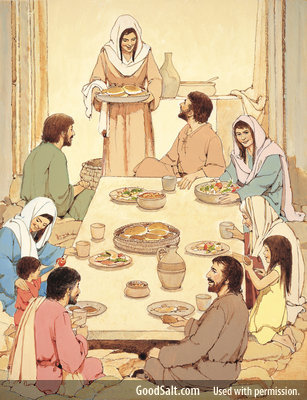 All these instances reveal the word meros is speaking about taking part in something. The word by itself never means "to not take part." To indicate not taking part, a negative adverb (such as "no") must come prior (as in the case of John 13:8 above). In Colossians 2:16 there is no negative adverb thus the Colossians were being judged by outsiders concerning “eating and drinking” while they were TAKING PART of God’s Festivals and Sabbaths.
All these instances reveal the word meros is speaking about taking part in something. The word by itself never means "to not take part." To indicate not taking part, a negative adverb (such as "no") must come prior (as in the case of John 13:8 above). In Colossians 2:16 there is no negative adverb thus the Colossians were being judged by outsiders concerning “eating and drinking” while they were TAKING PART of God’s Festivals and Sabbaths.
“Let no man therefore judge you in eating and drinking when taking part of an Holyday, or of the New Moon, or of the Sabbath days.”
Please do not miss this important point here. It says nothing about “not” taking part. Most teachers try to read into this their own preconceived idea that the Festivals and Sabbaths were done away with at Christ’s death. They claim the Colossians were being judged for NOT taking part in the Festivals, New Moons, and Sabbaths and Paul was trying to encourage them by saying that the Festivals, New Moons, and Sabbaths were "nailed to the cross" so don't listen to those who are condemning you. However, the Greek is clear that the Colossians were being judged for eating and drinking while “taking part” in the Festivals, New Moons, and Sabbaths. So, instead of this passage being a proof text in support of the Festivals and Sabbaths being done away with, it is actually a solid reference to the fact that the Festivals and Sabbaths remain!
“The phrase ‘in eating and drinking’ most naturally means with respect to your eating and drinking, that is, in regard to the way you celebrate these festivals … Paul is not referring to the sacrificial system but to the participation of the believers in the festivals themselves.” (Tim Hegg, Colossians 2:16–17: A Study, TorahResource, p. 7)
“Colossians 2:16 should not be interpreted as a prohibition against observing the Sabbath, festivals, and new moons … Rather, Paul tells the Colossians not to let anyone condemn them for the way they celebrate these practices.” (David J. Rudolph, “Colossians 2:16–17,” in Introduction to Messianic Judaism, Zondervan, 2013, p. 183)
“Paul’s admonition in Colossians 2:16 presupposes that the community is actually observing the Sabbath and festivals ... The issue is criticism from outsiders, not whether these practices should continue.” (Mark S. Kinzer, Postmissionary Messianic Judaism, Brazos Press, 2005, p. 211)
And don’t miss this other point, that, like the believers in Corinth and Philippi, the Colossian assembly was primarily Gentiles (also known as “the uncircumcised”) who had accepted God’s free forgiveness and were taking part in God’s Festivals and Sabbaths:
"And you, being dead in your trespasses and the uncircumcision of your flesh, He has made alive together with Him, having forgiven you all trespasses." (Colossians 2:13)
In Acts chapter 13, Luke tells us that both Jews and Gentiles kept the seventh-day Sabbath together:
"Now when Paul and his party set sail from Paphos, they came to Perga in Pamphylia; and John, departing from them, returned to Jerusalem. But when they departed from Perga, they came to Antioch in Pisidia, and went into the synagogue on the Sabbath day and sat down. And after the reading of the Law and the Prophets, the rulers of the synagogue sent to them, saying, 'Men and brethren, if you have any word of exhortation for the people, say on.' ... So when the Jews went out of the synagogue, the Gentiles begged that these words might be preached to them the next Sabbath. Now when the congregation had broken up, many of the Jews and devout proselytes followed Paul and Barnabas, who, speaking to them, persuaded them to continue in the grace of God. On the next Sabbath almost the whole city came together to hear the word of God." (Acts 13:13-15, 42-44)
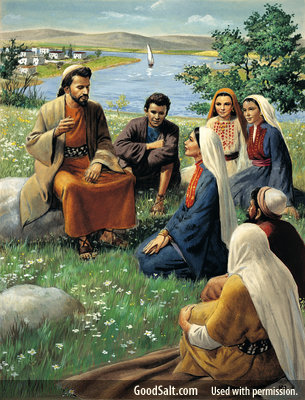 When Paul visited Philippi, he observed the Sabbath by a riverside because there was no Jewish Synagogue in that region (Acts 16:12-13). This is where Paul met Lydia who became the first Christian in Macedonia (now part of modern Greece, Acts 16:14-15). We saw earlier that, in Acts 20:6, Luke tells us that Paul also celebrated “the Days of Unleavened Bread” (which included Passover) along with the believers at Philippi. It is a known fact that the newly founded church of Philippi were Gentiles:
When Paul visited Philippi, he observed the Sabbath by a riverside because there was no Jewish Synagogue in that region (Acts 16:12-13). This is where Paul met Lydia who became the first Christian in Macedonia (now part of modern Greece, Acts 16:14-15). We saw earlier that, in Acts 20:6, Luke tells us that Paul also celebrated “the Days of Unleavened Bread” (which included Passover) along with the believers at Philippi. It is a known fact that the newly founded church of Philippi were Gentiles:
“In fact, the few people Scripture specifically mentions in connection with the Philippian church had Greek (Lydia, Acts 16:14-15; Euodia and Syntyche, Phil. 4:2) and Roman (Clement, Phil. 4:2) names … [The book of] Acts clearly indicates that no significant Jewish population existed in Philippi.” (Herbert W. Bateman IV, Were the Opponents at Philippi Necessarily Jewish? P. 42)
Then in Acts 20:16, Luke says:
“For Paul had determined to sail by Ephesus, because he would not spend the time in Asia: for he hasted, if it were possible for him, to be at Jerusalem the day of Pentecost."
Isaiah even mentions that we will continue to observe “the New Moon” and “the Sabbath” upon the new earth:
“'For as the new heavens and the new earth which I will make shall remain before Me,' says the Lord, 'So shall your descendants and your name remain. And it shall come to pass that from one New Moon to another, and from one Sabbath to another, all flesh shall come to worship before Me,' says the Lord." (Isaiah 66:22-23)
"Shadows of Things to Come"
This is why Paul said these Festivals and Sabbaths “are shadows of things to come” (Colossians 2:17). Paul did not say, nearly 30 years after the cross, that they were a shadow, as the New International Version wrongly interprets by saying, "These are a shadow of the things that were to come." Or as the Holman Christian Standard Bible states, "These are a shadow of what was to come." No, Paul said they are still a shadow of things to come. In Greek, "to come" is in the present active participle, implying these things are still pointing to future realities. A shadow isn't a "fake" thing; it is proof that the "substance" (Christ) is standing nearby. The shadow is not opposed to the reality but dependent on the source.
In Luke 22, we read:
“... 'With fervent desire I have desired to eat this Passover [shadow] with you before I suffer; for I say to you, I will no longer eat of it until it is fulfilled in the kingdom of God.' ... And He took bread, gave thanks and broke it, and gave it to them, saying, 'This is My body which is given for you; do this in remembrance of Me.'” (Luke 22:15-16, 19)
Concerning Moses, the book of Hebrews tells us, “By faith he kept the Passover and the sprinkling of blood ...” (Hebrews 11:28). He and all the children of Israel that night did what they did by faith. They didn’t put the blood on the door posts because they were “under the Law” but because they had faith in the God of Israel who had miraculously sheltered them from the plagues of Egypt. It was the Egyptians who did not have faith in the instructions of God who were under the Law and experienced its deadly consequence.
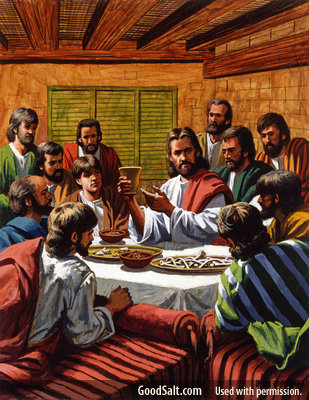 The same goes for us today. The killing of Passover lambs ceased with the crucifixion of Christ, virtually the last Passover, for the Lamb of God yet appears before the Father’s throne “as it had been slain” (Revelation 5:6) now offering, not the blood of lambs or goats, but His own blood (perfect life) for us. The typical system has ceased. Now the Real Lamb, who was dead but is now alive forevermore, is our Passover; “therefore, let us keep the feast with the unleavened bread of sincerity and truth" (1 Corinthians 5:7-8). We no longer keep the Passover of the Jews, but follow the example of Jesus in partaking of the Lord’s Supper symbols and practices at the appointed time of this Spring holy convocation— the 14th day of the first biblical month.
The same goes for us today. The killing of Passover lambs ceased with the crucifixion of Christ, virtually the last Passover, for the Lamb of God yet appears before the Father’s throne “as it had been slain” (Revelation 5:6) now offering, not the blood of lambs or goats, but His own blood (perfect life) for us. The typical system has ceased. Now the Real Lamb, who was dead but is now alive forevermore, is our Passover; “therefore, let us keep the feast with the unleavened bread of sincerity and truth" (1 Corinthians 5:7-8). We no longer keep the Passover of the Jews, but follow the example of Jesus in partaking of the Lord’s Supper symbols and practices at the appointed time of this Spring holy convocation— the 14th day of the first biblical month.
In place of the typical Passover lamb, we now have the antitypical Lamb. Yet the significance of the Passover deliverance from Egypt lives on in the commemoration of Christ’s death (at the same time) in our deliverance from sin by His death on the cross as the Lamb of God. It also lives on in the commemoration of the covenant God made with Abraham in Genesis 15.
In vision, Ezekiel and John saw the new earth and the restored tree of life “which bore twelve fruits, each tree yielding its fruit every month. The leaves of the tree were for the healing of the nations.” (Revelation 22:1-2; Ezekiel 47:1,12). Every month = every New Moon!
We know for a fact that the followers of Christ kept observing the seventh-day Sabbath along with the Festivals long after His ascension back to heaven:
- The Sabbath: (Acts 13:14; 42-44; 15:21; 15:13; 17:2; 18:4)
- Passover/Days of Unleavened Bread: (Acts 12:4; Acts 20:6; 1 Corinthians 5:6-8)
- Pentecost: (Acts 2; 20:16)
- The Day of Atonement: (Acts 27:9; this day became known as “the Fast”)
In volume 24, in his Ecclessiastical History, Eusebius quotes a letter from Irenaeus to Victor of Rome regarding Polycarp, saying that "he [Polycarp] had always observed it [Passover] with John the disciple of our Lord, and the rest of the apostles."
Writing in the year 195 A.D., Polycrates tells us that he continued to observe Passover upon the same day (the 14th of the first Hebrew month) as had others before him such as Phillip, John and Polycarp "according to the gospel." Again, not because they were "under the Law" but "according to the rule of faith":
“Therefore we keep the day [of Passover] undeviatingly, neither adding nor taking away, for in Asia [Minor] great luminaries sleep, and they will rise on the day of the coming of the Lord, when he shall come with glory from heaven and seek out all the saints. Such were Phillip… and two of his daughters… There is also John who lay on the Lord’s breast… And there is also Polycarp at Smyrna, both bishop and martyr, and Thraseas, both bishop and martyr, from Eumenaea…[Also] Sagaris,… Papirius, … and Melito … all of these kept the fourteenth day of the Passover according to the gospel, never swerving, but following according to the rule of the faith. And I also, Polycrates, the least of you all, live according to the tradition of my kinsmen, and some of them have I followed. For seven of my family were bishops and I am the eighth, and my kinsmen ever kept the day when the people put away the leaven. Therefore, brethren, I who have lived sixty-five years in the Lord and conversed with brethren from every country, and have studied all holy Scripture am not afraid of threats, for they have said, who were greater than I, ‘It is better to obey God rather than men.’” (Eusebius, Church History, Book V, Chapter 24; Nicene and Post-Nicene Fathers, Series Two, Volume 1)
Although these appointed times remained, the meaning and manner by which they were observed changed as God’s salvation plan progressed. For example, we have seen that animal sacrifices were offered upon these Festivals and Sabbaths (Numbers 28 and 29). In Hebrews chapter 10 the author points out that, although the animal sacrifices are done away with (see verses 1-18), we are not to “forsake the assembling of ourselves together” (verse 25).
So, we definitely see the disciples, along with other Jewish and Gentile believers, still observing the Festivals and Sabbaths long after the death, resurrection and ascension of Jesus, and we will continue to observe these appointed times upon the new earth. Scripture is clear they were not done away with.
For the Jews who rejected the Son of God, the types and ceremonies had indeed become useless traditions (see the article entiled, Does God Hate the Feast Days?). But for those who believe on His name and see in Him the fulfillment and substance of all these shadows, what was once glorious becomes even more glorious! Fulfillment does not mean abolition, but to fill full with meaning and significance. That’s why Jesus did not come to destroy the Law but to fulfill it (Matthew 5:19), to give it richer meaning, to magnify the Law and make it honorable (Isaiah 42:21).
What Then Was Nailed to the Cross?
So what then was nailed to the cross if it wasn’t the Feast days and Sabbaths? Paul says it was “the handwriting of ordinances that was against us” but what is that? Most teach that it is the “ordinances” of the law of Moses including all the Festivals and Sabbaths. However, the Greek word used here is δόγμα which simply means “dogma” in English. This Greek word is NEVER once used for anything related to God’s Law in the Septuagint. Every occurrence of dogma in the Greek Old Testament refers to man-made decrees or rulings. Most often it’s the decrees and judgments of pagan rulers.
The word used for “handwriting” is χειρόγραφον (cheirographon) which means, “a (handwritten) document, legal note, bond.” This is why many other translations use “certificate of debt (or, charges) contained in decrees.”
 New Living Translation: “He canceled the record of the charges against us and took it away by nailing it to the cross.”
New Living Translation: “He canceled the record of the charges against us and took it away by nailing it to the cross.”
English standard Version: “by canceling the record of debt that stood against us with its legal demands. This he set aside, nailing it to the cross.”
Berean Study Bible: “having canceled the debt ascribed to us in the decrees that stood against us. He took it away, nailing it to the cross!”
Aramaic Bible in Plain English: “And he has blotted out by his authority the bill of our debts which was adverse to us and he took it from the midst and nailed it to his cross.”
This “handwriting of ordinances” or “charges against us” in no way, can be speaking of God’s Festivals and Sabbaths which are meant as channels to bring us double portion blessings of His Holy Spirit. Jesus said, “the Sabbath was made FOR man”, not against man (Mark 2:27). We know for a fact that God’s Sabbaths are good statutes:
“Because they had not executed My judgments, but had despised My statutes, profaned My Sabbaths, and their eyes were fixed on their fathers’ idols. Therefore I also gave them up to statutes that were not good, and judgments by which they could not live.” (Ezekiel 20:25, New King James Version)
Clearly God’s Sabbaths are NOT against us. It was because they had profaned God’s Sabbaths that He gave them over to other statutes that were not good. He permitted them to add the “traditions of men” and “commandments and doctrines of men” in order for them to see the error in doing this. By adding additional strict requirements to God’s Festivals and Sabbaths, they delved deeper into legalism. God permitted their sin to abound so they would finally reach out and accept His free grace (Romans 5:20).
By submitting Himself to the death sentence, Jesus took our place in death. The charges were placed upon Him instead of us. These were not charges from God against the sinner, but condemning accusations from “the accuser of the brethren” – Satan (Revelation 12:9-10). This is why Paul says “When He (Jesus) had disarmed the rulers and the authorities, He made a public spectacle of them, triumphing over them in the cross” (Colossians 2:15). These “rulers and authorities” are the “rulers of darkness” and “spiritual forces of evil” (Ephesians 6:12). Just before Jesus was taken away by the priests and Roman soldiers He said, "When I was daily with you in the temple, ye stretched forth no hands against Me: but this is your hour, and the power of darkness" (Luke 22:53). Christ did not die as a victim of God’s justice, but submitted Himself to Satan’s justice enforced by man.
This is what Christ was taking away from our mindset. Any MAN-MADE “handwritten ordinance (dogma)” that places a barrier between us and God. We cannot fully enter into God’s rest if we are constantly believing He is a condemning Father who makes us do penance in order for Him to even look at us. We must realize that God did not forgive us because Jesus died. The death of Jesus reveals that God loves us and had already forgiven us “while we were yet sinners” (Romans 5:8). He had forgiven us from the day sin entered us and has been carrying us from “all the days of old” (Isaiah 63:9). “We love Him, because He first loved us” (1 John 4:19).
The Body is of Christ?
“Let no man therefore judge you in meat, or in drink, or in respect of an Holyday, or of the New Moon, or of the Sabbath days: Which are a shadow of things to come; but the body is of Christ.” (King James Version)
If you have a King James Version please notice that the word “is” is in italics. This means that word is not in the Greek and was supplied by the translators. The most common teaching is that all of God’s Festivals and Sabbaths were done away with at the cross. They were only “shadows” while Christ is the reality. They now say it is no longer necessary to observe these appointed times because Christ is now our Sabbath rest.
 However, the phrase, “the body of Christ”, without the word “is” refers to God’s people — “the church” (1 Corinthians 12:27) with Christ as “the Head” (Ephesians 5:23). Paul refers to this right in the beginning of his letter to the Colossians when he speaks of “Christ’s sufferings on behalf of his body, which is the church” (Colossians 1:24). And we see it again right in the context of Colossians chapter 2 when he says, “And you have been made complete in Christ, who is the Head over every ruler and authority” (Verse 10).
However, the phrase, “the body of Christ”, without the word “is” refers to God’s people — “the church” (1 Corinthians 12:27) with Christ as “the Head” (Ephesians 5:23). Paul refers to this right in the beginning of his letter to the Colossians when he speaks of “Christ’s sufferings on behalf of his body, which is the church” (Colossians 1:24). And we see it again right in the context of Colossians chapter 2 when he says, “And you have been made complete in Christ, who is the Head over every ruler and authority” (Verse 10).
So don’t let anyone outside the church (the body) condemn you for your faithful obedience to Christ (the Head) in partaking of God’s sacred Festivals and Sabbaths.
For more information to what you've just read, please refer to the book The Times of Refreshing.